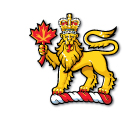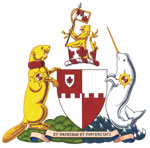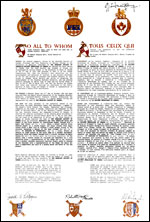- The Governor General of Canada

The contents of this Register are intended for research purposes only. The heraldic emblems found in the Register may not be reproduced in any form or in any media without the written consent of the Canadian Heraldic Authority and/or the recipient.
The Heraldry Society of Canada
Ottawa, Ontario
Registration of Arms, Supporters and Badge
October 20, 1991
Vol. II, p. 130
Click on each image to enlarge. The blazon and symbolism for each element will accompany the enlarged image.
Blazon
Arms
Quarterly per fess embattled Gules and Argent in the first quarter an inescutcheon Argent charged with a maple leaf Gules;
Crest
Issuant from maple leaves Gules a demi lion Or holding a staff proper flying to the sinister therefrom a banner of the Arms fringed Or;
Supporters
On the dexter side a beaver sejant Or collared and dependent by a ring therefrom Gules a representation of the Badge and on the sinister side a narwhal (monodon monoceros) haurient Argent armed Or charged on the shoulder with a representation of the Badge the whole set upon a compartment per pale of a grassy mound and waves of the sea proper;
Motto
ET PATRIBUS ET POSTERITATI;
Badge
Within an annulet of eight points on the outer edge Or a roundel throughout quarterly Gules and Argent charged with a circlet ensigned by maple leaves Or;
Symbolism
Arms
Red and white are the colours of Canada and mark the Society as a national organization. The crenellated division line indicates its mandate to stand on guard for good heraldic practice in Canada. The small shield represents the subject of heraldry itself, and the maple leaf is the national emblem.
Crest
The lion is a quintessential heraldic emblem, and it appears both as a supporter and as a reference to the crest of the Arms of Canada. Before the original grant of arms, the Society used a lion and a maple leaf, a combination that also appeared in the armorial bearings of the Society's founding president, Alan Beddoe. The banner of the arms shows another form of heraldic display and can also refer to the sister science of vexillology, the study of flags. The maple leaves further the national symbolism.
Supporters
The supporters, each bearing the Badge of the Society, are recognizably Canadian animals. The beaver indicates the fur trade, which was instrumental in the development of our country; as such, it has appeared in Canadian heraldry for over 300 years. The horn of the narwhal can allude to the unicorn, a famous heraldic beast.
Motto
This Latin phrase means "For ancestors and posterity".
Badge
The colours at the centre of the Society's badge refer to the arms design, while the maple leaf coronet refers to Canadian heraldry. The compass rose indicates Canada's northern location, the wide reach of heraldry as an art and science, and the Society's goal of setting a true course for heraldry in Canada.
Background
Canada Gazette Information
The announcement of the Letters Patent was made on November 23, 1991, in Volume 125, page 3770 of the Canada Gazette.
Artist Information
Creator(s)
The armorial bearings and badge of the Heraldry Society of Canada were designed in the early 1970s by a committee composed of George Beley, Thomas Pullen, Alan Beddoe, Hans Birk, Harold Diceman, Norman Nunn, Phillips Till, and Gordon Macpherson (Chairman).
Painter
Artist of the College of Arms, London / Artiste du Collège d’armes, Londres
Calligrapher
* Not applicable / Sans objet
Recipient Information
Civil Institution
Cultural Organization
The recipient's emblems were originally recorded in the records of the College of Arms, London, England, 6 March 1972.



